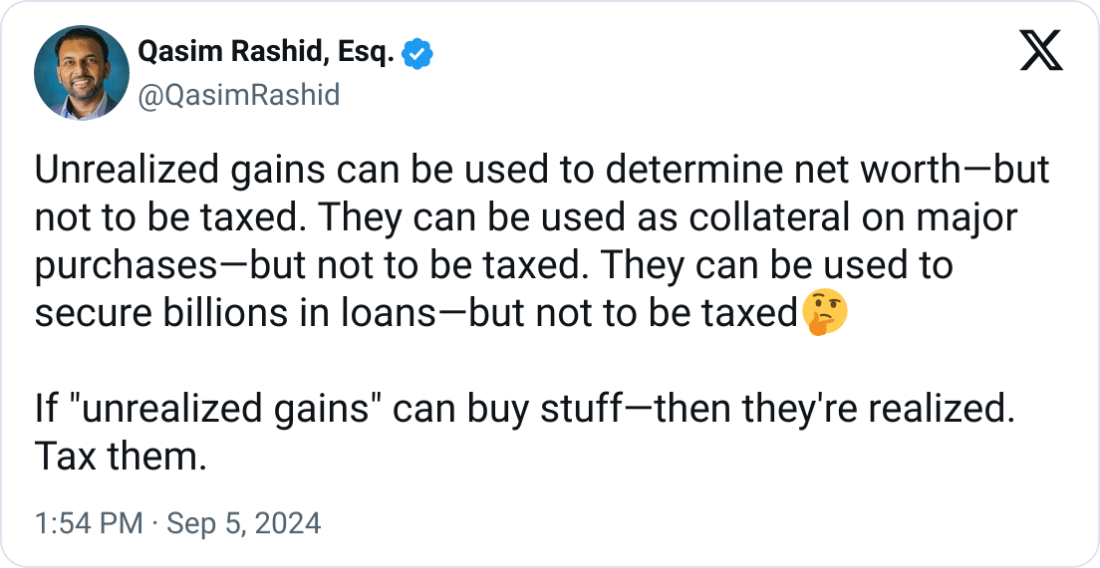this post was submitted on 19 Sep 2024
1598 points (96.8% liked)
Microblog Memes
6016 readers
3185 users here now
A place to share screenshots of Microblog posts, whether from Mastodon, tumblr, ~~Twitter~~ X, KBin, Threads or elsewhere.
Created as an evolution of White People Twitter and other tweet-capture subreddits.
Rules:
- Please put at least one word relevant to the post in the post title.
- Be nice.
- No advertising, brand promotion or guerilla marketing.
- Posters are encouraged to link to the toot or tweet etc in the description of posts.
Related communities:
founded 1 year ago
MODERATORS
you are viewing a single comment's thread
view the rest of the comments
view the rest of the comments

They shouldn't be taxed because they're just that, unrealized. They may be worth next to nothing one day. If you use them as collateral, you're still on the hook for the value you originally took out the loan for, regardless of the loss of the investment.
This argument applies to my wages too if I elect not to be paid in USD. Are you arguing that, say, Bitcoin income should be untaxable just because it could depreciate relative to the USD tax liability it generates.
How could you misunderstand his comment so completely?
Bitcoin is not money. You cannot file your tax return with a line-item with the number of Bitcoin you were paid. On a US tax return, you have to say how many USD you were paid. On a Canadian return, it is Canadian dollars. In the UK, it would be GBP.
If I demanded that my US employer paid me in GBP, they may do so. They would also track internally the dates they paid me, the value in USD that they paid me, and the exchange rate to GBP. The tax deducted from my check would be in USD.
This is part of the tax code in every country. You get paid in the currency of that jurisdiction ( regardless of how you choose to take payment ).
If you wanted to receive Bitcoin, it would be an investment. The taxable income would be the value on the day I received it. The value on the day that I sold is irrelevant. This is not “unrealized gains” by any stretch.
You cannot “elect” how to be paid for tax purposes. The currency on your return is a matter of law as are the rules about moving in and out of that currency. This is practically the definition of “realization”.
You can absolutely elect how to be paid, you can earn income abroad, receive benefits in kind, stock compensation etc. ALL of which may still be taxed. If your tax return only relates to dollar items, lucky you
The ignorance is strong in this one.
Then someone better tell the IRS because this is exactly how they treat crypto. And yes, people can elect to be paid in Bitcoin, I recall seeing various stories about it over the years.
You're getting confused between a payment & an investment. The medium in which you are paid is irrelevant. The payment is the end of the transaction and therefore is the point at which it is taxed.
Precisely. The medium of value delivery is irrelevant, as soon as you extract value by borrowing against an asset you have completed a transaction and therefore is a point at which it could (/should though that's the debate I guess) be taxed.
In both cases (payment in bitcoin or borrowing against stock) your remaining position could go to zero leaving you liable for tax you don't have money to pay, but that's on you to manage better.
No, it doesn't.